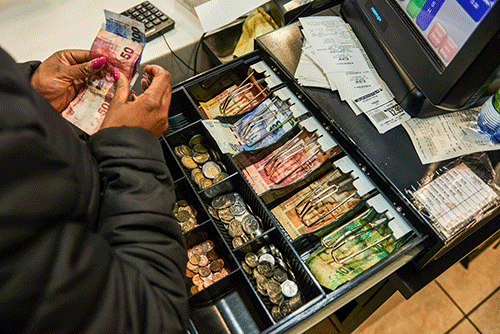SWAKOPMUND – Bank of Namibia governor Johannes !Gawaxab has urged fellow Common Monetary Area (CMA) central bank governors not to shy away from pointing out the adverse impact of a weak South African Rand.
According to !Gawaxab, the weakness of the Rand has severe spillover effects, particularly on smaller countries in the region that are net importers of goods and services.
!Gawaxab was speaking during the CMA governors’ meeting, hosted by BoN in Swakopmund last week. Besides Namibia, the meeting included South Africa, Lesotho and Eswatini for the second quarterly CMA Governors’ meeting this year.
“Governors, the weakness of the Rand in most recent times has led to intense debates in countries participating in the CMA. We shouldn’t shy away from pointing this out and reflect on mitigating strategies in light of the direct but varied impact in each of our countries. Whilst acknowledging these concerns, it is the considered view of the Bank of Namibia that the benefits of its membership in the CMA outweighs the costs,” the governor positioned.
The meeting was aimed at building on discussions from the previous gathering in Maseru, Lesotho, and set the stage for developing clear action plans to effectively implement the CMA strategy and enhance cross-border payments, exchange controls and financial stability within CMA member countries.
The CMA is a monetary union that includes South Africa, Namibia, Lesotho and Swaziland.
While each of these sovereign nations issues its currency, all four currencies are effectively governed by the South African Reserve Bank, and they are valued and exchanged at par with the South African Rand. The Rand has been experiencing some depreciation lately due to energy challenges and South Africa’s greylisting.
In May 2023, the Namibia Statistics Agency (NSA) said South Africa remains the largest source of imports for Namibia.
The import basket mainly comprised petroleum oils, copper ores and concentrates, motor vehicles for the transportation of goods, civil engineering and contractor’s
equipment, as well as motor cars for the transportation of persons.
Last month, !Gawaxab noted benefits from the current fixed one-to-one exchange rate arrangement between the Namibia Dollar and the South African Rand outweigh the costs, stating that delinking is not an option, as it would severely negatively impact the domestic economy in various ways.
He added Namibia is not yet at the point of thinking about delinking.
“We wouldn’t even want to tolerate or engage in a debate that we are thinking of delinking the currency. Anyone else is free to think about that. But as BoN, our position is the current arrangement serves the country quite well. With a small open economy, we can hardly influence anything. And we don’t even think about the conditions of a possible exit,” !Gawaxab pointed out.
Furthermore, during his introductory remarks at the governor’s meeting, !Gawaxab noted of growing concern among the public regarding the persistent cost of living challenge.
“We have been decisive and remain committed to our mandate to combat inflation. Headline inflation in the CMA remains elevated and averages 6.4% for the first quarter of 2023, but the nature of the inflation challenge is changing.
“We are seeing a decline in the inflation rate, as shocks that drove up inflation wane and our monetary policy actions are transmitted to the economy. We are not out of the woods yet, but inflation expectations appear to be anchoring. I do not doubt that we will all stay the course to bring inflation down to where it belongs,” stated the governor.
!Gawaxab also said the dominance of the US Dollar as a reserve currency has become topical again. This is as many countries and traders are mooting alternative currency regimes for international trade.
The governor pointed out the exorbitant privilege of the US Dollar that the USA is able to borrow at lower interest rates on international markets. This effectively means other countries are effectively subsidising America’s debt.
Alternative currencies, such as those in Brazil, Russia, India and China (BRICS) or a continental currency for Africa, are also being mooted, he said.
“Any alternative reserve currency needs to satisfy the criteria around convertibility, liquidity, rule of law and deep capital markets. The fact that oil is priced in the US$ is another key consideration in this debate. We are following the debate around alternative currencies, knowing that a lot of water will have to flow into the ocean before the status quo changes. The transition to a new reserve currency, if it happens, is a slow process, much like a snail’s race,” said the central bank governor.
He added that for an African currency to become a reality, it would require continental similarities in inflation, debt levels, fiscal policies and banking rules – to mention but a few.


